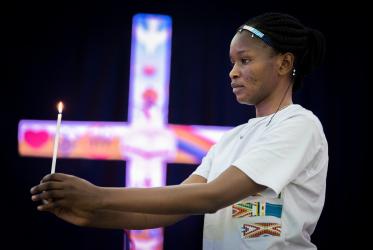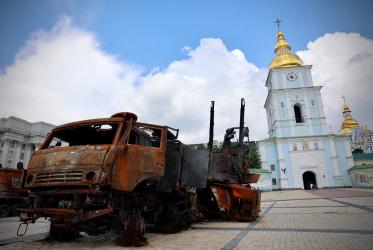From 18-25 January, Christians across the world will bear witness to Jesus’s prayer for his disciples that “they may be one so that the world may believe.”
Whether praying together, exchanging preachers, or planning ecumenical services, congregations and parishes will come together in many ways during the World Council of Churches (WCC) Week of Prayer for Christian Unity.
WCC general secretary Rev. Dr Olav Fykse Tveit said that spiritual ecumenism is at the heart of the ecumenical movement.
“Prayers for Christian unity mean that, despite divisions, we already experience the fellowship of the baptized; it means that we pray for them and they pray for us across our differences,” he said. “As churches pray for each other and pray together for others and for justice and peace, the Holy Spirit equips them to fulfil their common calling and grow into a living fellowship.”
Rev. Dr Odair Pedroso Mateus, WCC director of Faith and Order, described how visible division among Christian churches is a sin because we know from the New Testament and confess in the creed that the church is one.
“Is Christ divided?” Mateus asked. “Sin calls for repentance, confession, conversion. The way from visible division to visible unity is therefore inseparable from prayer.”
Growing towards visible unity through prayer is a local experience, he continued. “Those who feel the pain of division in each place are called to gather and pray for themselves and the others.”
In 2018, the theme for the week is "Your right hand, O Lord, glorious in power,” inspired by Exodus 15:6. Resources for the week have been prepared by members of different churches in the Caribbean.
“This year, Christians from the Caribbean, who have experienced enslavement, oppression, marginalisation, invite us to pray for unity and celebrate freedom with Moses and his half-sister Miriam,” said Mateus.
The text for these resources is jointly published by the Pontifical Council for Promoting Christian Unity and the WCC, through the WCC's Commission on Faith and Order, which also accompanies the entire production process of the text.
Traditionally, the week is celebrated between the feasts of St Peter and St Paul. In the southern hemisphere, where January is a vacation time, churches often find other days to celebrate it, for example around Pentecost, which is also a symbolic date for unity.
In Geneva, Switzerland
The joint Catholic-Lutheran Commemoration of the Reformation in Lund and Malmö, Sweden, on 31 October 2016 marked a very important ecumenical moment. As a sign of continuous commitment with the one ecumenical movement the Lund Cross created for the Joint Commemoration will be placed in the chapel of the Ecumenical Centre. The cross will be dedicated during a service on the first day of the Week of Prayer for Christian Unity on 18 January.
The Catholic Church will be represented by Cardinal Koch, the LWF by Rev. Dr Martin Junge and the WCC by Rev. Dr Olav Fykse Tveit. Cardinal Koch and Rev. Dr Kaisamari Hintikka will preach together.
The Assembly of Churches and Christian Communities of Geneva will organize a local celebration for the Week of Prayer for Christian Unity at the chapel of the Ecumenical Centre, on 24 January at 19:00. This will also be an opportunity to begin celebrating the WCC’s 70th anniversary year in a prayerful atmosphere. The service will be followed by a reception in the lobby.








